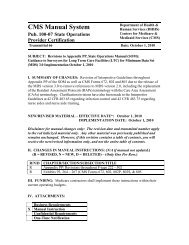LOUISIANA Community Mental Health Services Block Grant ...
LOUISIANA Community Mental Health Services Block Grant ...
LOUISIANA Community Mental Health Services Block Grant ...
You also want an ePaper? Increase the reach of your titles
YUMPU automatically turns print PDFs into web optimized ePapers that Google loves.
Coordinator position and developed a new District-wide Employment Program to meet the<br />
employment needs of transition age youth and adults with emotional disorders/behavioral disorders,<br />
severe mental illnesses, addictive disorders, developmental disabilities, and co-occurring disorders,<br />
particularly those who are not served by the LAHIRE program. Region III serves ages 16-18<br />
through Career Solutions: The Work Connection by assisting youth who are looking for job<br />
placement and career enchantment. In Region IV, Louisiana Rehabilitation <strong>Services</strong> assist<br />
individuals with disabilities to obtain job training or education. The National Guard Youth<br />
Challenge Program (ages 16 - 18) assists high school dropouts to obtain job training and a GED.<br />
The Lafayette Parish School System / Options Program assist high school students to obtain a<br />
certificate in a vocation when a high school diploma will not be obtained.<br />
Region V refers transitional age youth to Transition Workshops for training on adult issues, resume<br />
building, and networking. Calcasieu Parish Schools Job for Americas also offers a program in<br />
Region V to help high school students with job training mentoring and job placement. Louisiana<br />
Rehabilitation <strong>Services</strong> (LRS) has a transitional age program to assist with job readiness and<br />
placement for individuals 17 years of age and older who are graduating from high school. Families<br />
Helping Families hold transition fairs and offers resources from area agencies to youth in grades 11<br />
and 12. In Region VII, Special Education Transition Team helps special education students connect<br />
with vocational services, trainings, and sheltered workshops. In FPHSA, The Youth Career<br />
Development Project is funded by a grant from the US Department of Labor to teach construction<br />
skills to youth between the ages of 16 and 24 with little or no work history. Additionally, the public<br />
school system in this area offers various on-the-job trainings to students in special education<br />
classes. These trainings are provided by local businesses. In JPHSA the Adolescent Job<br />
Shadowing/Apprentice Program serves youth between the ages of 14 and 20. This program offers<br />
job readiness curriculum support as well as stipend exposure to the workforce with the assistance of<br />
a mentor.<br />
The overall goal of OMH employment initiatives is to create a system within the Office of <strong>Mental</strong><br />
<strong>Health</strong> that will encourage and facilitate consumers of mental health services to become employed,<br />
thereby achieving greater self-determination and a higher quality of life, while helping consumers<br />
transition from being dependent on taxpayer supported programs; to being independent, taxpaying<br />
citizens contributing to the economic growth of our state and society. The national economy has<br />
made this goal an extremely challenging one at best. Nationwide, a suffering economy can have a<br />
spiraling effect as workers are laid off and the need for public assistance increases. However, when<br />
resources are not available, the solution-focused alternative is to assist clients in obtaining and<br />
maintaining employment through help with resume-writing, job searching, and interviewing skills.<br />
HOUSING SERVICES<br />
FY 2011 – Child/Youth<br />
While there are by some measures a limited number of available alternative housing resources for<br />
children and adolescents with an emotional or behavioral disorder, the philosophy of the Office of<br />
<strong>Mental</strong> <strong>Health</strong> has been to preserve the family system in their natural setting while delivering<br />
appropriate and effective mental health services. In keeping with that philosophy, the housing<br />
efforts of OBH have been directed toward resources that will impact families rather than separating<br />
children into segregated housing. Overall, the movement in housing nationally has been away from<br />
segregated congregate living and toward permanent supportive housing, providing supportive<br />
services to individuals and families in the housing of their choice.<br />
PART C <strong>LOUISIANA</strong> FY 2011 PAGE 202<br />
SECTION III: CHILD/ YOUTH PLAN – CRITERION 1<br />
COMPREHENSIVE COMMUNITY-BASED MENTAL HEALTH SERVICES -- SYSTEM OF CARE & AVAILABLE SERVICES
















